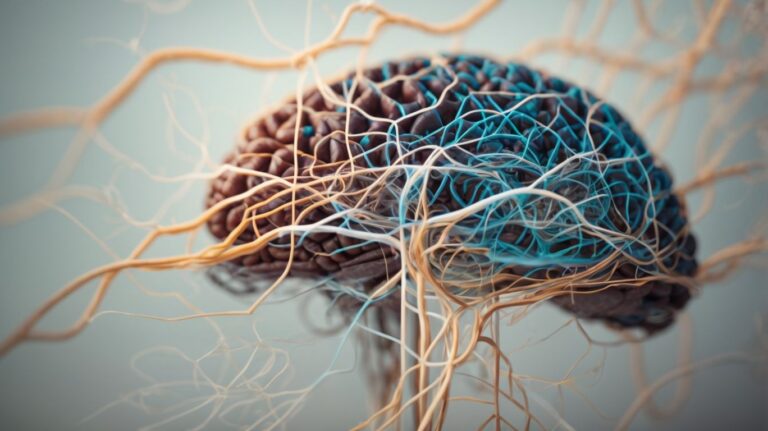Do you find yourself tossing and turning at night, unable to fall asleep? Or do you wake up frequently and struggle to get back to sleep? If so, you may be experiencing insomnia.
In this article, we’ll delve into the different types of insomnia, the potential causes, and how it can affect the brain. We’ll also explore the symptoms, diagnosis, and treatment options for this common sleep disorder.
So grab a cup of tea, get comfortable, and let’s dive into understanding insomnia from a psychological perspective.
Contents
- 1 Key Takeaways:
- 2 What Is Insomnia?
- 3 What Are the Different Types of Insomnia?
- 4 What Causes Insomnia?
- 5 How Does Insomnia Affect the Brain?
- 6 What Are the Symptoms of Insomnia?
- 7 How Is Insomnia Diagnosed?
- 8 What Are the Treatment Options for Insomnia?
- 9 Frequently Asked Questions
- 9.1 What is insomnia from a psychological perspective?
- 9.2 How does stress contribute to insomnia?
- 9.3 Can anxiety cause insomnia?
- 9.4 What role do negative thoughts play in insomnia?
- 9.5 How does behavioral therapy help with insomnia?
- 9.6 What are some tips for improving sleep from a psychological perspective?
Key Takeaways:
- Insomnia is a sleep disorder that affects a person’s ability to fall or stay asleep, leading to daytime fatigue and impairments in daily functioning.
- There are different types of insomnia, including transient, acute, and chronic, each with its own unique characteristics and duration.
- Insomnia can be caused by psychological factors, medical conditions, and environmental factors, and can impact brain waves, neurotransmitters, and emotional processing.
What Is Insomnia?
Insomnia is a sleep disorder characterized by chronic difficulty in falling asleep or maintaining sleep, affecting millions of Americans and recognized by prominent medical organizations such as the Centers for Disease Control and Prevention, and the DSM-5 and the International Classification of Sleep Disorders.
Individuals experiencing insomnia may often find themselves tired and irritable during the day, impacting their productivity and general well-being. Prolonged lack of quality sleep can contribute to a range of health issues, including hypertension, heart disease, and mental health disorders.
The Centers for Disease Control and Prevention acknowledges the widespread impact of insomnia and highlights its significance as a public health concern.
Similarly, the DSM-5 and the International Classification of Sleep Disorders provide formal recognition of insomnia as a legitimate medical condition, leading to the development of specific diagnostic criteria and treatment guidelines.
What Are the Different Types of Insomnia?
Insomnia manifests in various types, including transient insomnia, acute insomnia, and chronic insomnia, each exhibiting distinct characteristics and diagnostic criteria as outlined by the International Classification of Sleep Disorders and the DSM-5.
Transient Insomnia
Transient insomnia is a brief sleep disorder often linked to situational stress or environmental factors, leading to temporary sleep difficulties and restlessness.
Transient insomnia can occur as a result of significant life events, such as changes in employment, financial concerns, or issues in relationships. Those experiencing this type of insomnia may struggle to fall or stay asleep, resulting in daytime exhaustion, irritability, and trouble focusing.
However, by implementing effective stress management methods, relaxation techniques, and creating a comfortable sleep environment, transient insomnia can often be resolved without the use of medication or long-term interventions.
Acute Insomnia
Acute insomnia represents a short-term sleep disorder that can arise from medical conditions, trauma, or environmental factors, and may progress to chronic insomnia if left untreated.
In many cases, acute insomnia lasts for a few days or weeks and can often be linked to specific events or stressors. Shift work, jet lag, or situational anxiety are common triggers.
Moreover, stress from major life events, such as job loss, relationship problems, or financial worries, can disrupt sleep patterns. It’s crucial to recognize and address these underlying factors to prevent the condition from transitioning to chronic insomnia, which can have lasting impacts on physical and mental health.
Chronic Insomnia
Chronic insomnia represents a persistent and long-term sleep difficulty, with underlying genetic, molecular, and cellular mechanisms, often involving neuroendocrine dysregulation.
Understanding the potential genetic and molecular underpinnings of chronic insomnia is essential for identifying new treatment approaches and personalized interventions.
Recent research has indicated that certain genetic variants may predispose individuals to chronic sleep disturbances, shedding light on the hereditary nature of this condition.
Moreover, neuroendocrine mechanisms play a crucial role in regulating the sleep-wake cycle, with dysregulation in hormones such as cortisol, melatonin, and orexin impacting the onset and maintenance of insomnia.
The intricate interplay between genetic predisposition, molecular pathways, and neuroendocrine signaling underscores the complexity of chronic insomnia as a multifaceted disorder.
What Causes Insomnia?
Insomnia can be caused by a combination of psychological factors, medical conditions, environmental influences, and hyperarousal, involving complex genetic, molecular, and cellular mechanisms.
Psychologically, stress, anxiety, and depression can disrupt sleep patterns, while medical conditions such as chronic pain, asthma, or neurological disorders can also contribute to insomnia.
Similarly, environmental factors like noise, light, and temperature can disrupt sleep. Hyperarousal, which involves an overactive stress response system, can keep individuals awake.
The underlying genetic predisposition and molecular pathways related to neurotransmitters, circadian rhythm, and brain activity play pivotal roles in the development and perpetuation of insomnia.
Psychological Factors
Psychological factors such as stress, anxiety, and depression can significantly contribute to the development and persistence of insomnia, often requiring cognitive and behavioral therapy for effective management.
Indeed, psychological issues can disrupt the natural sleep-wake cycle, leading to difficulties in falling asleep, staying asleep, or experiencing non-restorative sleep.
Stress is known to increase arousal and alertness, making it challenging to relax and unwind for sleep. Similarly, anxiety can result in hyperarousal, causing racing thoughts and physical tension that interfere with sleep.
Moreover, depression often manifests as insomnia, with individuals struggling to fall asleep or experiencing early morning awakenings.
Medical Conditions
Various medical conditions, including chronic pain, respiratory disorders, neurological conditions, and certain medications, can contribute to the onset and exacerbation of insomnia, necessitating targeted treatment approaches.
Chronic pain, such as arthritis or fibromyalgia, can lead to disrupted sleep patterns. This can make it challenging for individuals to fall asleep or stay asleep.
Similarly, underlying respiratory disorders like sleep apnea or chronic obstructive pulmonary disease (COPD) often cause sleep disturbances. This is due to breathing difficulties during the night.
Neurological conditions like Parkinson’s disease or Alzheimer’s can also disrupt the brain’s sleep-wake cycle, leading to insomnia.
Environmental Factors
Environmental factors such as noise, light, and temperature can profoundly impact sleep patterns and contribute to insomnia, emphasizing the importance of sleep hygiene and lifestyle modifications for mitigation.
Noise, whether it’s traffic sounds, snoring, or even a ticking clock, can disrupt sleep and increase the risk of insomnia.
Similarly, excessive light exposure, especially from electronic devices or bright bedroom lights, can interfere with the body’s natural sleep-wake cycle.
On the other hand, improper room temperature, whether it’s too hot or too cold, can lead to restless nights and difficulty falling asleep. Understanding the impact of these environmental factors is crucial for improving sleep quality.
Implementing sleep hygiene practices, such as creating a calming bedtime routine, optimizing the sleep environment, and maintaining a consistent sleep schedule, can help mitigate the effects of these environmental influences.
Lifestyle adjustments, such as reducing screen time before bed, investing in blackout curtains or white noise machines, and regulating room temperature, play a significant role in promoting better sleep.
By addressing these environmental factors and incorporating these beneficial changes, individuals can experience a noticeable improvement in their sleep patterns and overall well-being.
How Does Insomnia Affect the Brain?
Insomnia can impact the brain through alterations in brain waves, disruptions in neurotransmitter activity, and profound effects on emotional processing, involving key neuroendocrine elements such as GABA, corticotropin-releasing hormone, and adrenocorticotropic hormone.
When an individual experiences insomnia, the typical pattern of brain waves can be notably affected.
Inadequate sleep can lead to an increase in beta brain waves, associated with alertness and concentration, during times when the brain should ideally be transitioning into lower frequency waves, such as alpha and theta waves, indicative of relaxation and sleep.
This disruption in brain wave patterns can have far-reaching consequences, impacting not only sleep quality but also cognitive function and emotional well-being.
Changes in Brain Waves
Insomnia can lead to alterations in brain waves as observed through EEG recordings, affecting the transition between sleep stages, particularly impacting slow-wave sleep patterns.
Research has shown that individuals with chronic insomnia often display reduced slow-wave sleep, which is crucial for memory consolidation and cognitive functions.
This decrease in slow-wave sleep can result in cognitive impairment, difficulty concentrating, and decreased alertness during the day, impacting overall cognitive performance.
Disruptions in sleep stage transitions can lead to fragmented sleep and decreased sleep efficiency, exacerbating the impact of insomnia on brain function.
Disruptions in Neurotransmitters
Insomnia can disrupt the balance of neurotransmitters such as GABA, glutamate, serotonin, and dopamine, influencing receptor activity and responsiveness to agonists and modulators.
When the equilibrium of these neurotransmitters is disturbed, it can lead to dysregulation of sleep-wake cycles, mood, and cognitive function.
GABA, the major inhibitory neurotransmitter, plays a crucial role in promoting relaxation and sleep. Conversely, glutamate, the primary excitatory neurotransmitter, is involved in wakefulness and arousal.
Serotonin regulates mood and has a calming effect, while dopamine is linked to motivation and reward processing.
Impact on Emotional Processing
Insomnia can significantly impact emotional processing, affecting mood regulation, stress responses, and the neuroendocrine functions of the HPA axis, contributing to psychiatric perspectives on the disorder.
The relationship between insomnia and emotional processing is complex and multifaceted. Individuals with insomnia often experience heightened emotional reactivity, leading to difficulties in managing moods effectively. This can manifest as increased irritability, impulsivity, and a reduced threshold for stress.
Disrupted sleep patterns can alter the activity of the hypothalamic-pituitary-adrenal (HPA) axis, affecting the release of cortisol and other stress-related hormones. These disruptions can further exacerbate the impact of insomnia on emotional regulation and overall psychological well-being.
What Are the Symptoms of Insomnia?
The symptoms of insomnia encompass difficulty falling asleep, frequent nocturnal awakenings, and persistent daytime fatigue, indicative of disruptions in the sleep-wake cycle and associated with chronic sleep difficulties.
When an individual experiences difficulty falling asleep, it is often characterized by prolonged tossing and turning in bed, racing thoughts, and heightened alertness. These sleep initiation challenges can lead to frustration and anxiety, exacerbating the problem.
Nocturnal awakenings further compound the issue, causing sleep fragmentation and reducing the overall duration of restorative sleep.
The persistent daytime fatigue arising from these disturbances affects cognitive function, mood, and overall well-being, impacting daily productivity and quality of life.
Difficulty Falling Asleep
Difficulty falling asleep is a hallmark symptom of insomnia, reflecting prolonged sleep initiation, increased sleep latency, and underlying hyperarousal contributing to sleep disturbances.
Insomnia patients often experience difficulty in calming their racing thoughts at night, leading to prolonged sleep latency. This hyperarousal presents challenges in achieving the essential relaxation required for sleep initiation.
Heightened alertness, both mentally and physiologically, worsens the problem, creating a cycle where the frustration of not being able to drift off easily further exacerbates the situation.
Consequently, the overall sleep quality is severely compromised, impacting cognitive function, mood regulation, and overall well-being.
Waking Up Frequently
Frequent nocturnal awakenings represent a common symptom of insomnia, leading to sleep fragmentation and compromised sleep maintenance throughout the night.
These frequent interruptions in sleep continuity can result in an overall reduction in total sleep time, preventing individuals from achieving the recommended 7-9 hours of quality sleep.
The constant wakings can disrupt the natural sleep cycles, leading to a decrease in the amount of deep, restorative REM sleep, which is crucial for cognitive functioning and emotional well-being.
This sleep fragmentation can cause individuals to wake up feeling unrefreshed, fatigued, and irritable, impacting their ability to concentrate, make decisions, and engage in daily activities with alertness.
Feeling Tired During the Day
Persistent daytime fatigue and feelings of tiredness are indicative of insomnia, often leading to cognitive impairments, compromised performance, and attentional deficits associated with chronic sleep difficulties.
Individuals grappling with insomnia may find themselves experiencing difficulties concentrating on tasks or making decisions, as the persistent fatigue hinders their cognitive function.
Reduced performance at work or in academic settings is a common consequence, impacting one’s ability to effectively execute tasks and contribute to overall productivity.
Attentional challenges, such as struggling to stay focused or easily becoming distracted, can impede daily activities and interactions with others.
It’s important to address these implications to improve the overall quality of life for individuals affected by insomnia.
How Is Insomnia Diagnosed?
The diagnosis of insomnia involves comprehensive clinical assessments aligned with the diagnostic criteria outlined in the International Classification of Sleep Disorders and the DSM-5, emphasizing the need for thorough evaluation of sleep disturbances and associated symptoms.
Healthcare providers utilize various validated questionnaires, such as the Insomnia Severity Index and Pittsburgh Sleep Quality Index, to gather detailed information about the individual’s sleep patterns, sleep quality, and daytime functioning.
The assessment may encompass a review of medical and psychiatric history, medication usage, and lifestyle factors that could contribute to sleep disruptions.
These evaluations are conducted with meticulous attention to detail to identify the underlying causes and tailor treatment plans according to the specific needs of the patient.
What Are the Treatment Options for Insomnia?
The treatment options for insomnia encompass cognitive behavioral therapy, pharmacological interventions, and lifestyle modifications, including the use of benzodiazepines and nonbenzodiazepine benzodiazepine receptor agonists to address sleep difficulties and improve overall sleep quality.
Cognitive behavioral therapy (CBT) for insomnia focuses on addressing the underlying thoughts and behaviors that contribute to sleep disturbances.
Through techniques such as stimulus control and sleep restriction, CBT aims to retrain the brain and establish healthier sleep patterns.
Pharmacological interventions, on the other hand, involve the use of medications such as sedative-hypnotics, melatonin agonists, and orexin receptor antagonists to target specific neurotransmitters and receptors involved in regulating sleep-wake cycles.
Lifestyle modifications encompass a broad range of practices, including maintaining a consistent sleep schedule, creating a conducive sleep environment, and incorporating relaxation techniques to promote relaxation and reduce anxiety that can interfere with sleep.
Cognitive Behavioral Therapy
Cognitive behavioral therapy for insomnia (CBT-I) comprises various techniques such as sleep diary monitoring, stimulus control, and sleep restriction, designed to address maladaptive sleep patterns and promote sustainable improvements in sleep quality.
Stimulus control practices involve associating the bed and bedroom with sleep and establishing a regular sleep schedule to strengthen this connection. This includes discouraging stimulating activities in the bedroom and using the bed only for sleeping.
Individuals are encouraged to wake up at the same time every day, regardless of their sleep duration, to regulate their internal body clock.
Sleep restriction techniques aim to consolidate sleep by initially restricting the time spent in bed to the actual amount of sleep obtained. As the person’s efficiency improves, the time in bed gradually increases.
This helps to enhance the drive for sleep and reduce wakefulness during the night, leading to improved overall sleep quality and efficiency.
Medications
Medications for treating insomnia may include benzodiazepines, nonbenzodiazepine benzodiazepine receptor agonists, and sedative-hypnotics, targeting GABAergic mechanisms to induce and regulate sleep patterns.
These medications act on the neurotransmitter gamma-aminobutyric acid (GABA) to enhance its inhibitory effects, effectively promoting relaxation and drowsiness.
Benzodiazepines such as diazepam and lorazepam bind to specific GABA receptors, which results in sedative, anxiolytic, and muscle relaxant properties.
On the other hand, nonbenzodiazepine benzodiazepine receptor agonists like zolpidem and eszopiclone target the same receptors, but with a more selective approach, reducing the risk of dependency and tolerance.
Certain sedative-hypnotics, such as ramelteon and suvorexant, work on the sleep-wake cycle by targeting melatonin receptors and orexin receptors, respectively, bringing about improvements in sleep initiation and maintenance.
Lifestyle Changes
Lifestyle changes play a pivotal role in managing insomnia, encompassing practices such as sleep hygiene improvements, relaxation techniques, exercise, dietary adjustments, and adherence to a consistent sleep-wake routine for overall sleep enhancement.
Addressing sleep hygiene involves creating an environment conducive to quality sleep. This includes optimizing bedroom conditions, setting a regular sleep schedule, and avoiding electronic devices before bedtime.
Incorporating relaxation techniques like meditation, deep breathing, or progressive muscle relaxation can help reduce stress and prepare the body for rest.
The significance of physical activity cannot be overstated. Regular exercise promotes better sleep quality and duration.
In terms of dietary considerations, it’s important to limit caffeine and heavy meals close to bedtime. Instead, embracing sleep-friendly foods such as turkey, bananas, and almonds can aid in improving sleep patterns.
Frequently Asked Questions
What is insomnia from a psychological perspective?
Insomnia is a sleep disorder characterized by difficulty falling asleep or staying asleep. From a psychological perspective, it involves a complex interplay of thoughts, emotions, and behaviors that can contribute to the development and maintenance of insomnia.
How does stress contribute to insomnia?
Stress is a common trigger for insomnia. When we experience stress, our bodies release hormones that increase alertness and arousal, making it harder to fall asleep. Frequent or chronic stress can disrupt our sleep patterns and lead to persistent insomnia.
Can anxiety cause insomnia?
Anxiety can contribute to insomnia in several ways. Anxiety can cause racing thoughts and worry, making it hard to relax and fall asleep. It can also lead to physical symptoms, such as muscle tension and increased heart rate, which can interfere with sleep.
What role do negative thoughts play in insomnia?
Negative thoughts and beliefs about sleep can perpetuate insomnia. For example, worrying about not being able to sleep can create a self-fulfilling prophecy and make it harder to fall asleep. Challenging and changing these thoughts can help improve sleep.
How does behavioral therapy help with insomnia?
Behavioral therapy, also known as cognitive-behavioral therapy for insomnia (CBT-I), is a treatment approach that can help address the underlying psychological factors contributing to insomnia. It focuses on changing behaviors and thoughts that interfere with sleep.
What are some tips for improving sleep from a psychological perspective?
Some tips for improving sleep from a psychological perspective include practicing relaxation techniques, creating a comfortable sleep environment, and implementing a consistent bedtime routine. It can also be helpful to address any underlying psychological issues through therapy or other techniques.




